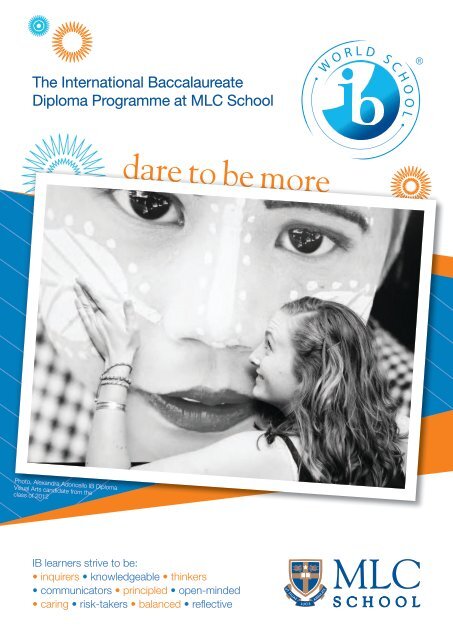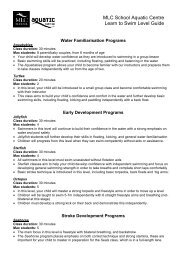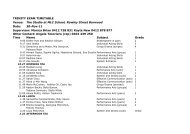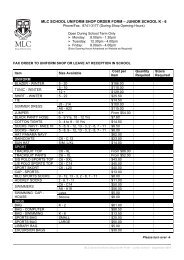MLC School IB brochure.
MLC School IB brochure.
MLC School IB brochure.
Create successful ePaper yourself
Turn your PDF publications into a flip-book with our unique Google optimized e-Paper software.
The International Baccalaureate<br />
Diploma Programme at <strong>MLC</strong> <strong>School</strong><br />
Photo, Alexandra Adoncello <strong>IB</strong> Diploma<br />
Visual Arts candidate from the<br />
class of 2012<br />
<strong>IB</strong> learners strive to be:<br />
• inquirers • knowledgeable • thinkers<br />
• communicators • principled • open-minded<br />
• caring • risk-takers • balanced • reflective
The International Baccalaureate ® (<strong>IB</strong>) Diploma Programme<br />
The International Baccalaureate Diploma Programme is a comprehensive and rigorous twoyear<br />
course of study, undertaken in Years 11 and 12. It is chosen by a range of students as an alternative<br />
to studying the NSW Higher <strong>School</strong> Certificate.<br />
The programme is based on the International Baccalaureate Organization (<strong>IB</strong>O)’s Mission Statement*:<br />
The International Baccalaureate Organisation aims to develop inquiring,<br />
knowledgeable and caring young people who help to create a better and<br />
more peaceful world through intercultural understanding and respect.<br />
To this end the <strong>IB</strong>O works with schools, governments and international<br />
organisations to develop challenging programmes of international education<br />
and rigorous assessment.<br />
The <strong>IB</strong>O encourages students across the world to become active,<br />
compassionate and lifelong learners who understand that other people,<br />
with their differences, can also be right.<br />
Worldwide, the <strong>IB</strong> Diploma Programme is recognised by leading universities for providing the academic<br />
challenge required for future university success.<br />
These are the reasons the <strong>IB</strong> Diploma Programme has such popularity and has seen rapid international<br />
growth, in both State and Independent schools, since its foundation in Geneva over 40 years ago.<br />
There are more than 969,000 <strong>IB</strong> students at over 3,290 schools in more than 141 countries – and the<br />
numbers are growing!<br />
Language A1<br />
<strong>IB</strong> Diploma Programme Curriculum<br />
Second<br />
language<br />
Experimental<br />
sciences<br />
Individuals<br />
and societies<br />
Mathematics<br />
and computer<br />
science<br />
Students select one subject from each of five<br />
different discipline areas and a sixth may be an<br />
arts discipline or another subject from groups 2,<br />
3 or 4. This ensures a breadth of experience in<br />
languages, humanities, experimental sciences<br />
and mathematics, a key feature of the Diploma<br />
that makes it different from the HSC.<br />
• Three of the six subjects are studied at higher<br />
level (HL) each representing 240 teaching hours<br />
over 2 years<br />
The arts<br />
• The remaining three subjects are studied at<br />
standard level (SL) each representing 150<br />
teaching hours over 2 years.
There are three core requirements that are central to the <strong>IB</strong> Diploma experience.<br />
The Extended Essay (EE)<br />
Students complete a 4000-word<br />
research essay in a discipline area<br />
of choice, on a topic formulated and<br />
negotiated between the student and<br />
a supervisor. Recent topics at <strong>MLC</strong><br />
have included:<br />
“To what extent was the United<br />
States responsible for the<br />
emergence of the Taliban in<br />
the 1980s?”<br />
History, Liz Ribeiro (2011)<br />
“Should ‘Leung Wai Kee Buddhist<br />
Craft and Joss Stick Trading Co.<br />
Pty Ltd’ invest in E-commerce?”<br />
Business and Management,<br />
Lauren Lee (2011)<br />
“How does J.M. Barrie’s Peter<br />
Pan destabilise the notion of<br />
a prescribed paradigm for the<br />
ideal child?”<br />
English, Elizabeth Lam (2011)<br />
“An investigation into the<br />
constraints and strategies of<br />
implementing bushfire safety<br />
designs into existing houses.”<br />
Design Technology,<br />
Kate McKay (2011)<br />
“The Aesthetics of The<br />
Dispossessed: A Critical Analysis of<br />
Shirin Neshat, Xu Bing and Banksy”<br />
Visual Arts,<br />
Sophie Jerapetritis (2011)<br />
Creativity, Action and<br />
Service (CAS)<br />
CAS is a distinctive feature of the<br />
<strong>IB</strong> Diploma and aligns strongly with<br />
<strong>MLC</strong> <strong>School</strong>’s values. It encourages<br />
students to take risks, explore,<br />
and challenge themselves. <strong>MLC</strong><br />
girls engage in many “outside the<br />
classroom” activities and these can<br />
lead to outstanding CAS projects<br />
such as:<br />
• Creativity, including a wide<br />
range of arts activities as well<br />
as creativity in designing and<br />
implementing service projects.<br />
• Action, which can include<br />
participation in individual and team<br />
sports, taking part in expeditions<br />
and in local or international<br />
projects.<br />
• Service, that encompasses a<br />
host of community and social<br />
service activities.<br />
The satisfactory completion of this<br />
non-examined core component is<br />
mandatory for the award of the<br />
<strong>IB</strong> Diploma.<br />
Theory of Knowledge<br />
(TOK)<br />
TOK is a course unique to the <strong>IB</strong><br />
Diploma, challenging students to ask<br />
“How do we know what we know?”<br />
TOK aims to develop a student’s<br />
critical capacity to analyse, make<br />
connections, consider possibilities<br />
and understand that all individual<br />
and cultural perspectives may<br />
have strengths and weaknesses.<br />
In understanding the nature of<br />
knowledge, this course has relevance<br />
to all the subjects chosen in the <strong>IB</strong><br />
Diploma. Like all other <strong>IB</strong> Diploma<br />
subjects TOK is assessed, and this<br />
includes essays and presentations.<br />
TOK is not only a ‘subject’ but rather, a<br />
way of thinking. It encourages us to think<br />
laterally and to express our personal<br />
voice. Through the last two years, I have<br />
come to appreciate the value, as well as<br />
the limitations, of knowledge but more<br />
importantly, TOK has allowed me to reach<br />
the true potential of an <strong>IB</strong> learner.<br />
Lucy Cavallaro, Class of 2011<br />
Through CAS I can see the struggles<br />
of those around me and realise the<br />
need for change and compassion in<br />
a society like ours. It is just so easy to<br />
ignore poverty and move on with our<br />
lives... While awareness campaigns have<br />
definitely done their job, being granted<br />
an opportunity to work for those who<br />
experience constant daily struggles, in<br />
such a close proximity to my home, really<br />
surprises me but also grounds me.<br />
Annie Wang, Class of 2012
Key Benefits of the<br />
<strong>IB</strong> Diploma Programme<br />
Many students in Year 10 are uncertain about their<br />
vocational or career options. Research shows that despite<br />
a demonstrated capacity, girls still under-enrol in maths and<br />
sciences in senior years, and this limits their tertiary choices.<br />
The <strong>IB</strong> Diploma requirement, that students take subjects<br />
from each area of the curriculum, including these subjects,<br />
is particularly beneficial for girls.<br />
The <strong>IB</strong> Diploma programme is recognised around the<br />
world and ensures an increased adaptability and mobility<br />
for <strong>IB</strong> students.<br />
The curriculum of the <strong>IB</strong> Diploma Programme has an<br />
international perspective of learning and teaching, while<br />
insisting that students fully explore their home culture and<br />
language.<br />
<strong>IB</strong> World <strong>School</strong>s must undergo an exhaustive authorisation<br />
process in order to offer one or more of the programmes,<br />
which includes a study of the school’s resources and<br />
commitment to the <strong>IB</strong> mission and philosophy.<br />
<strong>IB</strong> Diploma teachers participate in a wide variety of<br />
professional development opportunities to constantly update<br />
their knowledge and share their expertise with colleagues<br />
around the world.<br />
Many students graduating from the <strong>IB</strong> Diploma Programme<br />
find that it enhances their opportunities at tertiary<br />
institutions. The <strong>IB</strong>O works closely with universities around<br />
the world to gain recognition for <strong>IB</strong> programmes.<br />
The core components of the <strong>IB</strong> Diploma Programme<br />
encourage students to participate in creative and serviceoriented<br />
activities, while at the same time emphasising the<br />
importance of reflection on a personal and academic level.<br />
The <strong>IB</strong> Diploma<br />
experience for <strong>MLC</strong> girls<br />
The thing I enjoyed most about the <strong>IB</strong> was the noncompetitive<br />
nature of the course and the willingness of<br />
our cohort to help each other out which meant a huge<br />
amount of note sharing and studying together.<br />
Hannah Bruce<br />
<strong>IB</strong> Score 45 ATAR 99.95<br />
The <strong>IB</strong> allowed me to study a very diverse range of<br />
subjects I enjoyed, without having to worry about<br />
scaling or rankings. It allowed me to achieve the best<br />
I could without feeling like I was competing with the<br />
other people in my class,<br />
Liane Papantoniou<br />
<strong>IB</strong> Score 44 ATAR 99.80<br />
The most pleasing aspect of the <strong>IB</strong> was my Extended<br />
Essay. To be given the freedom to independently<br />
research and write about a topic of my choice was<br />
wonderful and I learnt a lot from the process.<br />
Amelia Noble<br />
<strong>IB</strong> Score 44 ATAR 99.80<br />
The <strong>IB</strong> truly allowed me to be independent in thought<br />
and action – the <strong>IB</strong> promotes individualism – it lets you<br />
do the subjects and extra-curricular activities you want,<br />
and it also let you focus on areas within a subject that<br />
you find interesting.<br />
Sanjana Dang<br />
<strong>IB</strong> Score 43 ATAR 99.60<br />
The small class sizes of the <strong>IB</strong> created an exceptional<br />
environment for me to excel in my particular subjects.<br />
Being able to develop a close relationship with the<br />
talented teachers and dedicated students meant that<br />
studying the course became an enjoyable way to<br />
explore my passion in my subjects.<br />
Eugenia Xiao<br />
<strong>IB</strong> Score 43 ATAR 99.60
The following table indicates the subjects<br />
<strong>MLC</strong> <strong>School</strong> has offered in recent years.<br />
Indicative <strong>IB</strong> Diploma Subjects offered at <strong>MLC</strong> <strong>School</strong><br />
Subjects<br />
Level<br />
Group 1 English A1<br />
HL & SL<br />
Group 2 French B<br />
HL & SL<br />
German B<br />
HL & SL<br />
Indonesian ab initio<br />
SL<br />
Italian ab initio<br />
SL<br />
Japanese B<br />
HL & SL<br />
Latin<br />
SL<br />
Group 3 Business and Management<br />
HL & SL<br />
Economics<br />
HL & SL<br />
Geography<br />
HL & SL<br />
History Route 1: Europe and the Islamic World HL & SL<br />
History Route 2: 20th Century World History HL & SL<br />
Group 4 Biology<br />
HL & SL<br />
Chemistry<br />
HL & SL<br />
Design Technology<br />
HL & SL<br />
Physics<br />
HL & SL<br />
Group 5 Mathematical Studies<br />
SL<br />
Mathematics<br />
HL & SL<br />
Group 6 Dance<br />
HL & SL<br />
Music<br />
HL & SL<br />
Theatre<br />
HL & SL<br />
Visual Arts<br />
HL & SL<br />
The <strong>IB</strong> Diploma<br />
Learner Profile*<br />
The aim of all <strong>IB</strong> Programmes<br />
is to develop internationally<br />
minded people who, recognising<br />
their common humanity and<br />
shared guardianship of the<br />
planet, help to create a better<br />
and more peaceful world.<br />
*©International Baccalaureate<br />
Organization, 2010<br />
<strong>IB</strong> learners strive to be:<br />
• inquirers<br />
• knowledgeable<br />
• thinkers<br />
• communicators<br />
• principled<br />
• open-minded<br />
• caring<br />
• risk-takers<br />
• balanced<br />
• reflective<br />
The <strong>IB</strong> Diploma Score conversion table †<br />
for entrance to Australian Universities<br />
<strong>IB</strong> Passing Score<br />
Combined Rank<br />
How the <strong>IB</strong> Diploma Programme is assessed<br />
In order to be awarded the diploma, a student must meet defined standards and<br />
conditions, including a minimum total of 24 points and the satisfactory completion<br />
of the three diploma requirements: TOK, the extended essay, and CAS.<br />
• 6 subjects with a maximum grade of 7 in each subject = 42<br />
• up to 3 bonus points for Extended Essay and TOK = 3<br />
• maximum or ‘perfect’ <strong>IB</strong> Diploma Score = 45<br />
Responsibility for all academic judgments about the quality of candidates’ work<br />
rests with examiners worldwide, led by chief examiners with international authority<br />
in their fields.<br />
<strong>IB</strong> Diploma scores are accepted at universities as either a direct score or<br />
converted to a UAC Rank or ATAR* equivalent, e.g. a score of 45 converts to the<br />
maximum ATAR or UAC Rank of 99.95. Students apply to tertiary institutions in<br />
the same way as students completing the HSC.<br />
*The Universities Admissions Centre (UAC) now awards the Australian Tertiary Admission Rank (ATAR) for HSC<br />
students. A Universities Admission Centre Rank (UAC Rank) is an equivalent award for <strong>IB</strong> Diploma Students.<br />
45 99.95<br />
44 99.80<br />
43 99.55<br />
42 99.20<br />
41 98.70<br />
40 98.05<br />
39 97.40<br />
38 96.60<br />
37 95.60<br />
36 94.15<br />
35 92.75<br />
34 91.10<br />
33 89.35<br />
32 87.30<br />
31 85.35<br />
30 82.40<br />
29 79.75<br />
28 77.70<br />
27 75.35<br />
26 73.00<br />
25 70.40<br />
24 67.25<br />
†<br />
The information in this table is applicable for 2012<br />
admissions only. Content is reviewed yearly.
<strong>MLC</strong> <strong>IB</strong> Diploma Results 2002 – 2010<br />
The average <strong>MLC</strong> <strong>School</strong> <strong>IB</strong> Diploma score<br />
is 36 converting to a UAC Rank (or ATAR<br />
equivalent) of 94.15<br />
Thirteen students have scored maximum<br />
points,a ‘perfect’ <strong>IB</strong> Diploma score, of 45<br />
32% of <strong>IB</strong> Diploma candidates have scored<br />
a UAC Rank or ATAR equivalent of 99.0+<br />
82% of <strong>IB</strong> Diploma candidates have scored<br />
a UAC Rank or ATAR equivalent of 90.0+<br />
© OCT 2011 <strong>MLC</strong> <strong>School</strong><br />
For further information please contact:<br />
Ms Anne Layman – <strong>IB</strong> Diploma Coordinator<br />
alayman@mlcsyd.nsw.edu.au<br />
Ms Myfanwy Stanfield – Director of Admissions<br />
mstanfield@mlcsyd.nsw.edu.au<br />
Tel +61 2 9747 1266<br />
www.mlcsyd.nsw.edu.au<br />
<strong>MLC</strong> <strong>School</strong> ABN 75 549 644 535 CRICOS No. 02328D<br />
A UNITING CHURCH DAY SCHOOL FOR GIRLS, PRE-KINDER TO YEAR 12

















